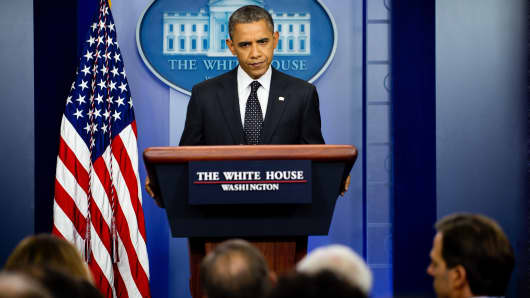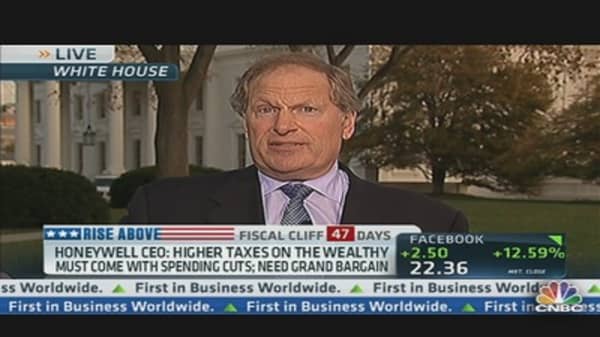In a challenge to Republicans, President Barack Obama urged Congress on Wednesday to extend expiring tax cuts immediately for all but the wealthiest Americans as a way to eliminate half of the "fiscal cliff" that threatens to send the economy back into recession.
In his first news conference in months, Obama insisted the economy cannot afford a tax increase on all Americans, and he urged Republicans to support an extension of existing tax rates for households earning less than $250,000.
"If we right away say 98 percent of Americans are not going to see their taxes go up — 97 percent of small businesses are not going to see their taxes go up," he said. "If we get that in place, we're actually removing half of the fiscal cliff."
Obama said the top priority in solving the country's fiscal crisis "must be jobs and growth."
He said he was confident that Republicans can join Democrats in avoiding the fiscal cliff before more than $600 billion in automatic spending cuts and tax increases take effect on Jan. 1.
"There's only one way to solve these problems and that is to do it together," Obama said. "I'm confident that we can do it."
The president's remarks were his first extended public discussion of the issue that is dominating the postelection session of Congress, and they followed statements earlier in the week from House Speaker John Boehner, R-Ohio, and Mitch McConnell of Kentucky, the Senate GOP leader.
Both men have said they, too, want a compromise and have said they are willing to support additional tax revenues as part of a deal that includes tax reform and measures to recast the government's largest benefit programs. But they appear to rule out any legislation that raises tax rates.
"There are so many challenges ahead of us," Boehner said Wednesday afternoon. "Our majority is up to the task and I suspect the president is, too."
In saying that the economy can't afford plunging into tax increases at the start of the year, the president distanced himself from some in his party who would prefer the tax increases and spending to occur to gain leverage.
"What we can then do is shape a process where we look at tax reform, which I'm very eager to do," he said. "I think we have to take a serious look at how we reform our entitlements because health-care costs continue to be the biggest driver of our deficits."
Obama is lobbying business and labor groups to support $1.6 trillion in new revenue to avoid the fiscal cliff, telling the two sides he remains committed to requiring the wealthy to pay more in taxes.
He met later Wednesday with about a dozen business executives. Business groups want an agreement before the end of the year, warning that the uncertainty could roil the financial markets and harm the economic recovery.
"I was encouraged by what I heard from the president at the meeting," Honeywell Chairman and CEO David Cote told CNBC. "He's clearly a smart man, we all know that. He gets it."
"I'm sure there's going to be a lot of forth and back here between Republicans and Democrats, Congress and the president, as they start to work their way to a deal," he said.
Cote said the 12 CEOS at the meeting "felt good" by what they heard. He said they were left with the feeling that "OK, these guys could actually get something done."
Obama and Democrats in Congress want the fiscal negotiations to concentrate heavily on revenue increases and much less on further spending cuts, a Senate Democratic aide said earlier.
The aide, who asked not to be identified, added that given Democratic wins in last week's elections and the nearly $1 trillion in spending cuts already enacted into law, revenue increases must take center stage now.
The goal, the aide said, is for $3 trillion in new deficit-reductions over 10 years on top of the nearly $1 trillion already enacted.
White House press secretary Jay Carney said the president would bring to the table a proposal for $1.6 trillion in new taxes on business and the wealthy when he begins discussions with congressional Republicans, a figure that Obama outlined in his most recent budget plan. The targeted revenue is twice the amount Obama discussed with Republican leaders during debt talks during the summer of 2011.
(Read More: Obama 'Open to New Ideas,' but Rich Must Pay More.)
Carney said the figure, combined with $1.1 trillion in spending cuts already signed into law, would reduce deficits by $4 trillion.
At the news conference, Obama also said he has seen no evidence that national security was threatened by the widening sex scandal that forced former Gen. David Petraeus to resign as CIA director.
He said he hoped the Petraeus sex scandal would be a "single side note" in the general's otherwise extraordinary career.
Petraeus resigned as head of the CIA last Friday because of an extramarital affair with his biographer, Paula Broadwell, who U.S. officials say sent harassing emails to a woman she viewed as a rival for the former general's affection. The investigation revealed that that woman, Jill Kelley, also exchanged sometimes-flirtatious messages with Gen. John Allen, the top military commander in Afghanistan.
The White House meeting with CEOs followed a gathering Tuesday of labor leaders and liberal groups in which participants said Obama remained clear that he would push for his campaign pledge of making the wealthiest Americans pay more in taxes.
"We're prepared to stand up to make sure there is shared sacrifice here, so the rich actually start paying their fair share and the middle class don't get soaked for that," said AFL-CIO President Richard Trumka.
Failure to act would lead to spending cuts and higher taxes on all Americans, with middle-income families paying an average of about $2,000 more next year, according to the nonpartisan Tax Policy Center.
Sen. Dick Durbin of Illinois, part of the Democratic leadership team, said Wednesday that many "many Republicans believe now is the time to sit down and talk more revenue." Durbin said the number of GOP lawmakers in the Senate willing to work toward accommodation now totals 20.
But Durbin also said "there is a great distance" between Republicans in the House and Senate, "and basically it comes down to the question of whether Speaker Boehner is willing to look for a bipartisan solution."
Durbin told MSNBC he thinks lawmakers should "use this fiscal cliff" to resolve a problem that has plagued Congress for four years.
The president pledged to raise taxes on the rich during his first term but backed off his stance in late 2010 after Republicans seized control of the House in the midterm election. During his meeting with labor leaders, Obama said he was not going to bend on letting tax cuts expire for top wage earners, according to a participant in the meeting who spoke on the condition of anonymity to discuss the private session. The president said the tax issue was clear during the election and said he had extended those enacted during the George W. Bush administration once and would not do so again, the participant said.
(Read More: Labor Backs Obama on 'Cliff' as Congress Returns.)
The CEOs have urged Congress to extend the Bush-era tax cuts until a tax overhaul can be reached and prevent the spending cuts from taking place. The executives say the uncertainty over the fiscal cliff is hurting the nation's business climate and preventing hiring.
The CEOs scheduled to attend included the heads of Aetna, Wal-Mart, Procter & Gamble and Ford.
The participants include members of the Campaign to Fix the Debt, a group founded by Alan Simpson and Erskine Bowles that has pushed for a long-term plan to fix the nation's debt and deficits.
Simpson, a former Wyoming senator, and Bowles, a former White House chief of staff, served as co-chairs of Obama's bipartisan National Commission on Fiscal Responsibility and Reform, which proposed $3 in spending cuts for every $1 in additional revenues.
Other CEOs scheduled to attend the meeting were General Electric CEO Jeff Immelt, who chairs Obama's jobs council, and American Express CEO Kenneth Chenault and Xerox CEO Ursula Burns, who are members of the council.
The Associated Press and Reuters contributed to this story.
Disclosure: GE is the minority owner of NBC Universal.




